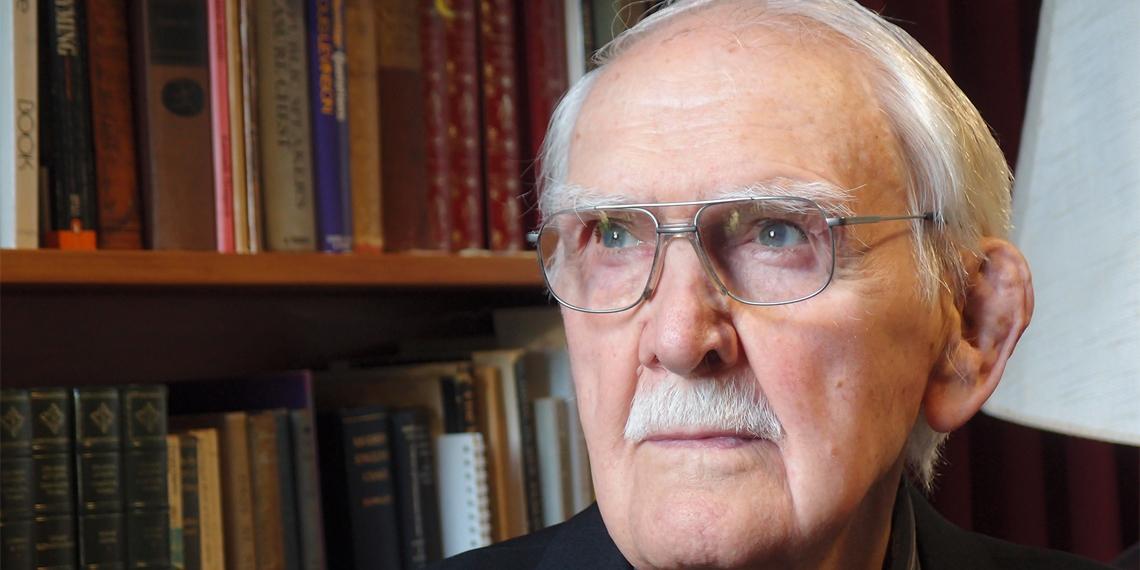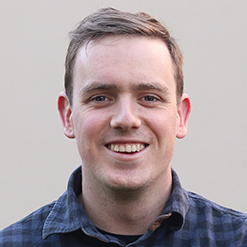You are here
A Holy Conversion

Neven MacEwan found fame as an All Black, until alcoholism and depression stripped him of the jersey. But God has changed Nev’s life—even returning to him the ‘prodigal jersey’.
Former All Black Neven MacEwan has had no shortage of mainstream media attention in recent days. Since the release of his memoir When the Crowd Stops Roaring, every major New Zealand news outlet has wanted to hear the story of Nev.
‘It’s been a bit of a surprise to me,’ Nev says down the phone from his home in Palmerston North. ‘I’ve managed to hide away and put the credit in the right direction.’ And by ‘right direction’ it has nothing to do with book sales. From the start of our conversation, it’s clear Nev is vocal and animated about his Christian faith—something which profoundly turned his life around 40 years ago.
Born for the lineout
Born in Auckland and raised in the Tasman region, Nev played 20 tests for the All Blacks between 1956 and 1962. Playing at lock and Number 8, he was—for a time—an integral part of the national forward pack.
Yet, for many years, he says football (soccer) was his sport of choice. Ironically, this was due to being ‘too heavy’ for the junior rugby grades. It wasn’t until after his 17th birthday that he gave into pressure from his older brothers to ‘take up the mantel’ as the next MacEwan to play rugby.
‘Very reluctantly I took on the game, to live up to the expectations my brothers had,’ he says.
Nev quickly found he was a natural in the lineout and immediately spent two years with the Nelson College first XV.
‘Nev, you’ve got an ability to jump for the ball,’ he was told. ‘Concentrate on that and everything else will fall into place.’
Nev spent hundreds of hours running and kicking balls with older brother Pat—the pair’s intensive training regime included runs on country roads around the family farm near the town of Wakefield.
‘All up we were running 32 miles (56km) a day, and while we thought nothing of it then, just the thought of it now makes my feet ache,’ he says.
In 1953, Nev shifted to the capital to begin teacher training. Sure enough, in the following year he found himself playing rugby for Wellington at provincial level. This soon led him to being picked for the All Blacks in 1956.
He claims his greatest performance with the ‘men in black’ didn’t come until 1961, against France on a ‘shocking Wellington day in atrocious conditions’.
‘I dominated the lineouts and that would be by far the best game I played for the All Blacks.’
Nev married high school sweetheart Jeanette Moulder in 1958, and the couple had four children—the last born in 1968. It was around this time a few challenges began to emerge.
Troubles in post-All Black life
Nev’s failure to make All Black selection in 1963 was a combination of drinking, injury and a run-in with selectors. However, he continued to play for Wellington and didn’t retire from the game completely until 1967. Yet it was this transition that came with a period of depression.
‘I was very insecure’, he says. ‘What I needed was something to give me confidence, and I found initially, that alcohol—when I was introduced to it in South Africa in 1960—started to give me the highs that got me through my lows.’
In his book, he describes alcoholism as being like a ‘prison’ that removed him from the normal range of emotional responses and responsibilities. ‘I was always trying to be what I thought others wanted me to be,’ he writes. ‘When I played rugby I was told to be a man, be more physical, and yet it wasn’t me. My real character was gentleness and that wasn’t to be realised until the process of recovery was well established.’ He says many of his insecurities stemmed from growing up in an unstable family environment in which his father, too, was an alcoholic.
The end of the road
It was in 1979 when the MacEwan family were living in Palmerston North, that Nev’s life abruptly hit rock bottom. While battling alcoholism, Nev worked for an organisation that promoted travel and tours to the Manawatū area. It was here he ‘borrowed’ some money and was later charged by the New Zealand Police for theft.
Ashamed, frightened and helpless, the situation became too much for Nev. He felt the only way out was to take his own life.
‘The shame and the guilt was crippling,’ he says. ‘And the shame and the guilt was what drove me to the point of thinking that the best thing is to eliminate the problem—which is me.’ Nev’s suicide attempt was unsuccessful. He was then taken to a detox ward for drug and alcohol patients in Palmerston North Hospital. But little did he know God was only just beginning to move.
‘Born again’
For 40-plus years, Nev says he’d never once given Christian faith a thought. While church was compulsory on Sundays for boarders at Nelson College, the idea of God and church bore zero significance to him.
‘I was indestructible, I was the man in control of my life …
I thought. But it was rapidly getting out of control,’ he says. ‘It’s the arrogance and the stupidity of any addiction. We think it’s good but it’s a life journey that is very, very destructive.’
But something radical was about to happen on Ward 5 of Palmerston North Hospital.
After a hospital visit from a local church community, Nev was given the book Born Again by Charles Colson. The memoir follows Colson’s journey into Christian faith, after he was briefly imprisoned for his involvement in the American Watergate scandal in the 1970s.
‘That book changed my thinking about God, and the process then of going to AA [Alcoholics Anonymous] and coming to the point of accepting the God of my understanding,’ he says. The following morning Nev decided to open a Bible—he just so happened to land ‘accidentally’ on John 14:6: ‘I am the way the truth and the life, no one comes to the father except by me’.
‘I then had to consider Jesus as my Lord and saviour. That step was rather easy because of that verse I stumbled upon that morning in my quiet time.’
Suddenly, Nev felt the kind of liberation he’d never experienced before—the shame and guilt he’d felt in the build-up to his suicide attempt was gone. ‘It was a freedom that was amazing. I also saw the Christian people who came into that ward in Palmerston North Hospital; they had something I didn’t have and I wanted it, no matter what the cost.
‘When I was hiding away in Ward 5 and that book Born Again was given to me, that was the light that came into my life.’
Nev attended AA and soon became sober. ‘Around me I had incredible support from people who believed that change was possible. And those people brought hope and amazing new beginnings.’
However, Nev’s spiritual transformation didn’t mean his theft charge would go away: he appeared in court in July 1979 and openly admitted to his offending. But instead of a prison sentence, he was given a ‘reprieve’ for his guilt and ordered to pay a $500 fine. There was now nowhere else to go except up.
Now sober and out of Ward 5, the Palmerston North All Saints’ vicar, David Penman, found Nev a job as a farmhand. He continued to go to AA and church meetings—he recalls attending as many as 11 ‘spiritually-themed’ meetings per week. ‘Some may think that was too many. Yet, when drinking, I had regularly attended a variety of spiritual houses of a different nature, more than 11 times a week!’
It was around this time the MacEwan family debts were rising high. But Nev asked God that his family would not have to sell their Palmerston North home. Miraculously, God came through and the family spent many more years in the home he and Jeanette had made.
New life begins
It was in 1984 that Nev was invited by the Anglican Church in Kawerau to attend a mission outreach. Here, he received a clear word that God was calling him into ministry. Sure enough, within six months he found himself working for Prison Fellowship New Zealand.
Later, when a job for a prison chaplain came up, Nev was adamant they would refuse to appoint anyone with a criminal record. He applied anyway, and funnily enough, God did the seemingly impossible—Nev was appointed chaplain at Manawātu Prison. This was a title he held for 16 years until his retirement in 2005.
Nev says it would have appeared the chaplain role was made for him, as he understood the spiritual place many of the inmates were in.
‘It was amazing how they would come to me and say: “Do you believe in this religious stuff?” And I would say, ‘No’ to them, and they would look perplexed and puzzled. I said I don’t believe in religious stuff at all, because that’s very dangerous, what I believe in is a living relationship with the living God. And that will always change you and challenge you about where you want to be and where you’re heading.’
In this role, Nev saw God work in a variety of ways. When three men turned up to his first chapel service, the inmates agreed it would be good to incorporate some music. But Nev was no musician. So he got on his knees and asked God to provide. As it happened, a top musician from the Palmerston North area was sentenced for a few years. Shortly after, another new inmate—a lead guitarist—found himself transferred to Manawatū from another prison. To top it off, an official in the prison gave permission for a local musician to bring his keyboard, mixers and sound equipment to the services. Within weeks, Nev found himself with a fully functioning worship band. They called themselves ‘Just Released’ and were even given guitars from local churches.
‘God used all of my life to reach those that were in prison.’
The principle of the gospel
When Nev’s family was struggling in the 1980s, he was forced to sell his All Black jerseys to survive. Nev recalls in his book how son Angus burst into tears when the last one was given away.
However, many years later, Angus was able to track the jersey down to a rugby club in Wales— he subsequently wrote to the club and asked for it back so that Nev’s grandchildren would have a piece of his history.
Sure enough, the club was delighted for the jersey to be returned to its original owner, and in 2005 Nev and Angus headed to Wales to retrieve it. Nev says the return of the jersey is one of the highlights of his book, in that it demonstrates that no sacrifice is wasted in the work of God.
‘What you give away comes back—you may not see it in your lifetime, but that’s a principle of the gospel message—what you give you will receive.’
When asked about what he wants to achieve with his book, Nev says he hopes it will get people thinking about what they’re here for, what life is all about. ‘There is a purpose for everybody and everybody has gifts and talents. They just need to find what it is.’
Nev wraps our yarn by quoting a verse from one of his favourite songs—Something Beautiful by Bill Gaither. ‘All I had to offer Him was brokenness and strife, but he made something beautiful of my life.’
By Hugh Collins (c) 'War Cry' magazine, 24 August 2019 p6-9. You can read 'War Cry' at your nearest Salvation Army church or centre, or subscribe through Salvationist Resources.
